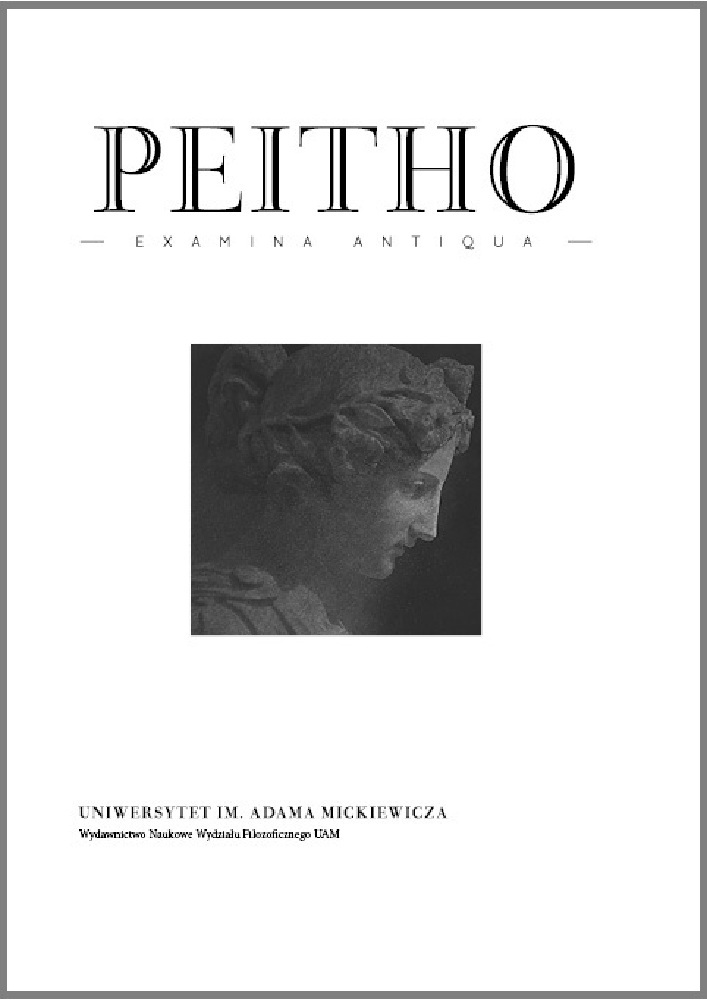Abstract
The Pseudo-Plutarchan De musica provides us with the oldest history of Greek lyric poetry from the pre-Homeric epic poetry to the lyric poetry of the fourth century B.C. Importantly, the work contains also an evaluation of the role of music in the process of educating and training the citizens. Ps. Plutarch (Aristoxenus) considers the καλόν in the aesthetic and ethical sense, which makes it incompatible with the καινόν dictated by the new poetic and musical season.
References
Anderson, W. D., 1966, Ethos and Education in Greek Music. The Evidence of Poetry and Philosophy, Cambridge.
Barker, A., 1984, Greek Musical Writings I. The Musicians and his Art, Cambridge [De musica, traduzione inglese e commento, pp. 205–257].
Barker, A., 2002, Euterpe. Ricerche sulla musica greca e romana, F. Perusino, E. Rocconi (cur.), Pisa.
Barker, A., 2014, Ancient Greek Writers on their Musical Past, Pisa–Roma.
Calame , C. (ed.), 1984, Alcman, Roma.
Cerri, G., 2007, La poetica di Platone. Una teoria della comunicazione, Lecce.
De Simone, M., 2011, “Dalla musica antica alla “nuova”: innovazioni e riprese nel racconto storico del De musica pseudo-plutarcheo”, Quaderni Urbinati di Cultura Classica 99 (128), pp. 83–96.
Durán Mañas, M., 2005, “La paideia y la música en Plutarco”, in: J. Montserrat et al. (eds.), Plutarc a la seva època: paideia i societat. Actas dell’VIII simposio español sobre Plutarco (Barcelona, 6–8 de novembre de 2003), Barcelona, pp. 69–76.
Einarson, B., De Lacy, P. H. (eds.), 1967, Plutarch’s Moralia with an English Translation, vol. XIV, London– Cambridge [De musica pp. 344–455].
Ercoles, M., 2009, “La musica che non c’è più… La poesia greca arcaica nel De musica pseudo-plutarcheo”, in: D. Castaldo, D. Restani, C. Tassi (cur.), Il sapere musicale e i suoi contesti da Teofrasto a Claudio Tolemeo, Ravenna, pp. 145–169.
Fongoni, A., 2006, “L’educazione di Telesia di Tebe fra tradizione e innovazione (Ps. Plut. Mus. 31, 1142BC)”, Paideia 61, pp. 197–205.
Fongoni, A. (ed.), 2014, Philoxeni Cytherii testimonia et fragmenta, Pisa–Roma.
Gostoli, A. (ed.), 1990, Terpander. Veterum testimonia, fragmenta, Roma.
Gostoli, A., 2011, “L’educazione musicale nella Grecia antica (Platone; Aristotele; Ps.Plutarco, De musica)”, in: A. Roselli, R. Velardi (cur.), L’insegnamento delle technai nelle culture antiche. Atti del Convegno, Ercolano 23–24 marzo, Pisa–Roma, pp. 151–163.
Gostoli, A., 2015, “Glauco di Reggio musico e storico della poesia greca nel V sec. a.C.”, Quaderni Urbinati di Cultura Classica 110 (139), pp. 125–142.
Hordern, J. H. (ed.), 2002, The Fragments of Timotheus of Miletus, Oxford.
Irigoin, J., 1987, “Histoire du texte des Oeuvres morales de Plutarque”, in: Plutarque, Ouvres morales, vol. 1.1, Paris, pp. CCXXVII–CCCX.
Lasserre, F. (ed.), 1954, Plutarque, De la musique, Olten–Lausanne.
Meriani, A., 2003, Sulla musica greca antica. Studi e ricerche. Prefazione di L. E. Rossi, Napoli.
Pöhlmann, E., 2011, “Ps. Plutarch, De musica. A History of Oral Tradition of Ancient Greek Music”, Quaderni Urbinati di Cultura Classica 99 (128), pp. 11–30.
Rocconi, E., 2012, “Aristoxenus and Musical Ethos”, in: C. A. Huffman (ed.), Aristoxenus of Tarentum. Discussion, New Brunswick–London, pp. 65–90.
Roesch, P., 1995, “Famiglie di auleti in Beozia”, in: D. Restani (cur.), Musica e mito nella Grecia antica, Bologna, pp. 125–133.
Rossi, L. E., 2000, “Musica e psicologia nel mondo antico e nel mondo moderno: la teoria antica dell’ethos musicale e la moderna teoria degli affetti”, in: A. C. Cassio, D. Musti, L. E. Rossi (cur.), Synaulía. Cultura musicale in Grecia e contatti mediterranei, Napoli, pp. 57–96.
Wilamowitz-Moellendorff, U. von, 1921, Griechische Verskunst, Berlin.
Ziegler, K., Pohlenz, M. (edd.), 1966, Plutarchi Moralia, vol. 4.3, Lipsiae.
License
Peitho provides immediate open access to its content on the principle that making research freely available to the public supports a greater global exchange of knowledge.
